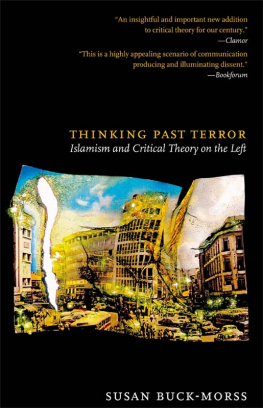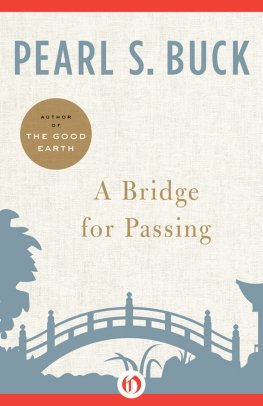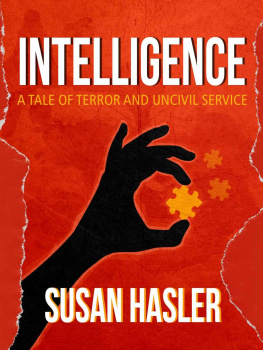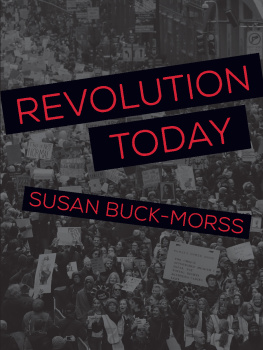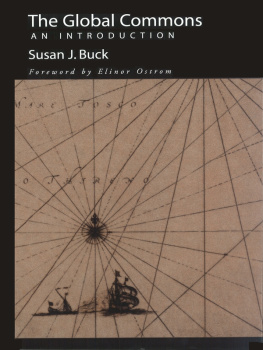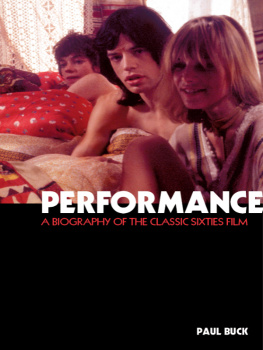Susan Buck-Morss - Thinking Past Terror
Here you can read online Susan Buck-Morss - Thinking Past Terror full text of the book (entire story) in english for free. Download pdf and epub, get meaning, cover and reviews about this ebook. publisher: Verso, genre: Politics. Description of the work, (preface) as well as reviews are available. Best literature library LitArk.com created for fans of good reading and offers a wide selection of genres:
Romance novel
Science fiction
Adventure
Detective
Science
History
Home and family
Prose
Art
Politics
Computer
Non-fiction
Religion
Business
Children
Humor
Choose a favorite category and find really read worthwhile books. Enjoy immersion in the world of imagination, feel the emotions of the characters or learn something new for yourself, make an fascinating discovery.
- Book:Thinking Past Terror
- Author:
- Publisher:Verso
- Genre:
- Rating:3 / 5
- Favourites:Add to favourites
- Your mark:
- 60
- 1
- 2
- 3
- 4
- 5
Thinking Past Terror: summary, description and annotation
We offer to read an annotation, description, summary or preface (depends on what the author of the book "Thinking Past Terror" wrote himself). If you haven't found the necessary information about the book — write in the comments, we will try to find it.
Thinking Past Terror — read online for free the complete book (whole text) full work
Below is the text of the book, divided by pages. System saving the place of the last page read, allows you to conveniently read the book "Thinking Past Terror" online for free, without having to search again every time where you left off. Put a bookmark, and you can go to the page where you finished reading at any time.
Font size:
Interval:
Bookmark:
This eBook is licensed to Shamil M.V, shamilmv00768@gmail.com on 10/12/2022
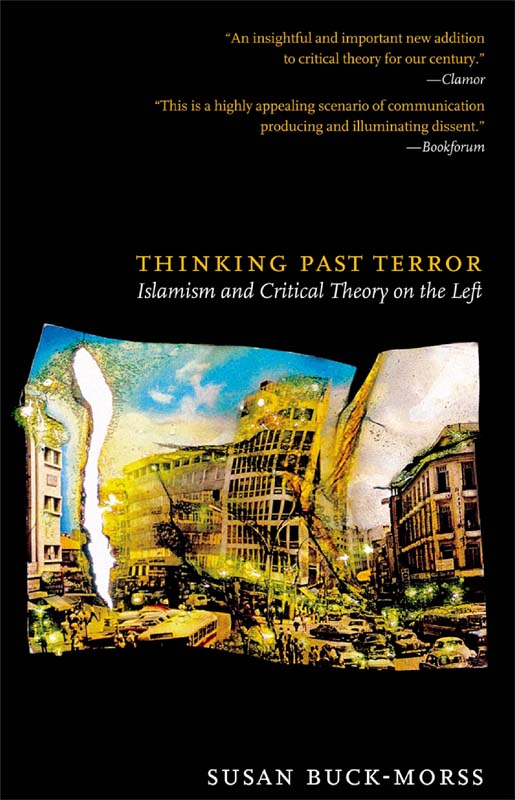
TERROR
ISLAMISM AND CRITICAL THEORY
ON THE LEFT

SUSAN BUCK-MORSS

This eBook is licensed to Shamil M.V, shamilmv00768@gmail.com on 10/12/2022
First published by Verso 2003
Susan Buck-Morss 2003
This edition published by Verso 2006
All rights reserved
The moral rights of the author have been asserted
1 3 5 7 9 10 8 6 4 2
Verso
UK: 6 Meard Street, London W1F 0EG
USA: 180 Varick Street, New York, NY 100144606
www.versobooks.com
Verso is the imprint of New Left Books
ISBN-13: 9781844675623
ISBN-10: 1844675629
British Library Cataloguing in Publication Data
A catalogue record for this book is available from the British Library
Library of Congress Cataloging-in-Publication Data
A catalog record for this book is available from the Library of Congress
Typeset in Minion by SetSystems Ltd, Saffron Walden, Essex
Printed and bound in the USA by Quebecor World, Fairfield
This eBook is licensed to Shamil M.V, shamilmv00768@gmail.com on 10/12/2022
For Teresa Brennan
19522003
This eBook is licensed to Shamil M.V, shamilmv00768@gmail.com on 10/12/2022
This book is dedicated to the memory of Teresa Brennan, who
cheered its writing, but did not see its birth. Her spirit nourishes
the global public sphere to which it is addressed.
This eBook is licensed to Shamil M.V, shamilmv00768@gmail.com on 10/12/2022
This eBook is licensed to Shamil M.V, shamilmv00768@gmail.com on 10/12/2022
AND CREDITS
Thanks to Verso Press, which took on this manuscript with enthusiasm, and particularly to Tim Clark for seeing the book through to completion with enormous helpfulness and skill. For layouts and image reproductions, special thanks to go Iftikhar Dadi and Joan Sage.
Images 16. From Wonder Beirut, Joana Hadjithomas and Khalil Joreige. Courtesy of the artists.
Image 7. Jos Clemente Orozco, The Dead (Los muertos), 1931, Museo de Arte Carrillo Gill, Mexico City/INBA 17268.
Images 814. inSITE2000. See the book of the project, Fugitive Sites, edited by Oswaldo Sanchez and Cecilia Garza.
Image 15. Iftikhar Dadi and Elizabeth Dadi, billboard installation, 2002. Courtesy of the artists.
This eBook is licensed to Shamil M.V, shamilmv00768@gmail.com on 10/12/2022
When a book is written in response to an historical event, precisely the history in it quickly recedes. The September 11 attacks on New York and the Pentagon, which were the impetus for these essays, have led to a measure of global violence that could not then have been imagined. The attacks themselves are now several wars away. A preface to the paperback edition needs to ask: When history recedes, what is left standing? What is the value of the book for readers today?
The books central proposal is that Islamism as a political discourse can be considered together with Critical Theory as critiques of modernity in its Western-developed form. It asks readers to suspend existing political identities and reconfigure the parameters of their discourse to recognize overlapping concerns. It does this performatively, analyzing the present through the work of contemporary Islamic rather than Western theorists. Its touchstones are not Agamben, iek, Derrida, or Habermas, but rather, Taha, Gannouchi, Shariati, and Qutb. Three years later, these names of Muslim political theorists are scarcely more familiar to Western intellectuals than before. Despite post-colonial sensibilities to the errors of orientalist discourse, despite all the sensitivity to constructions of the Other, with few exceptions (already existing and acknowledged in the book), Western critical theorists act as if all that is necessary is to draw on their own, existing models and traditions to define any new state of the world.
If religion has been allowed back on the theoretical agenda, it is St Paul who monopolizes the discussion. For a number of important Western theorists, Pauline Christianity has suddenly become fashionable. But it is an idealized and sanitized Paul, stripped of the anti-Semitism that was a consequence of Christianitys separation from its Jewish origins, with the first Jewish anti-imperialist revolt of 6670 C.E., and forgetful of Christianitys own imperial legacy, inherited from the Emperor Constantine, that culminated with the papal-led, medieval crusades against the Muslim world. Western philosophical traditions of the European Enlightenment, American democracy, and post-Nietzschean skepticism become conservative when deployed in a global context despite their intent, if they bolster and protect the presumption that Euro-American thinking is in advance of the rest of the world, hence adequate for its present understanding. It is one thing to champion multiculturalism in the spirit of Christian love, or Enlightenment cosmopolitanism, or democratic inclusion, or post-modern anti-essentialism; it is quite another to accept, when judged in global terms, the minority position of ones own intellectual culture, the present dominance of which cannot be explained solely on the basis of its intrinsic worth. My book is not a call for Western theorists to convert or be still. Rather, it implies the need to argue for our beliefs on truly foreign, and in many ways unpalatable, discursive terrains just as colonized people are routinely required to do vis--vis the invading culture, just as Muslim intellectuals have done since the Napoleonic invasions several centuries ago.
The sub-title of the book, Islamism and Critical Theory on theLeft, was meant as a challenge, and a question: to rediscover ones own commitments in a foreign political language, and to ask not only what is lost in translation but also what might be gained. How does Islam, which defines progress in terms of social cohesion rather than individual competition, and evaluates society in civil rather than personal terms, provide a corrective for the morally indifferent world of global markets, where social responsibility is an optional appendage to political life? How does the transnational strength of Islam as a highly contemporary phenomenon expose the fact that Western norms are not natural, not inevitable, but contingent and subject to change? In the reception of the book, it is not the descriptive term Left that has proved problematic. Muslim critical theorists have been grateful for the acknowledgement that the progressive policies they espouse are fully compatible with this positioning on the political spectrum, whereas the sort of Islamic politics that appeals to transnational Muslim elites is fully compatible with the self-enriching goals of economic globalization, not to speak of the right-wing agendas of extremists on issues of military violence and sexual control (which they share with right-wing supporters of George W. Bush). Being on the Left is an orientation, not a dogma. The word makes sense wherever progressive politics requires independent judgment (itjihad) rather than unquestioned obedience in thought and deed. Muslim feminists are a critical part of this Left, refusing on theological, social and legal grounds to equate Islam with the patriarchal society in which it has too long been embedded. Far more controversial has been my use of the word Islamism. It was at a meeting of
Font size:
Interval:
Bookmark:
Similar books «Thinking Past Terror»
Look at similar books to Thinking Past Terror. We have selected literature similar in name and meaning in the hope of providing readers with more options to find new, interesting, not yet read works.
Discussion, reviews of the book Thinking Past Terror and just readers' own opinions. Leave your comments, write what you think about the work, its meaning or the main characters. Specify what exactly you liked and what you didn't like, and why you think so.

